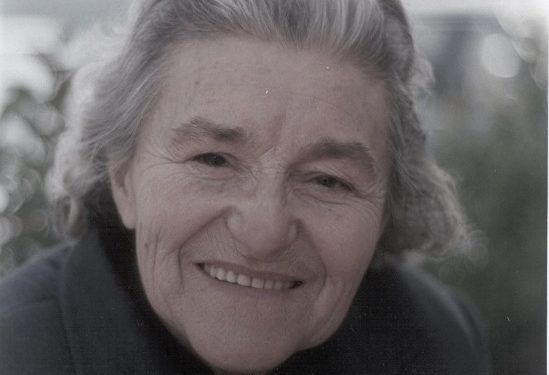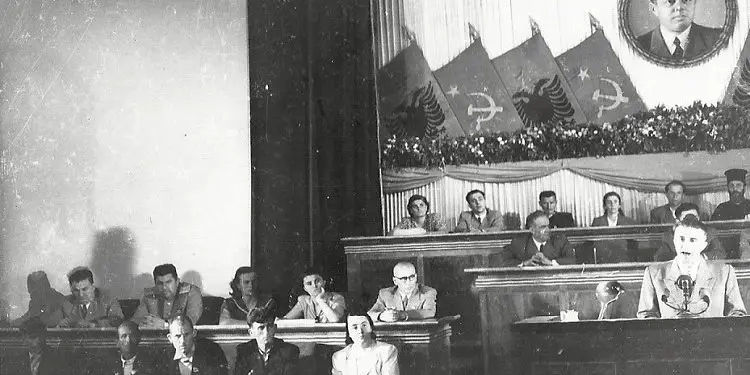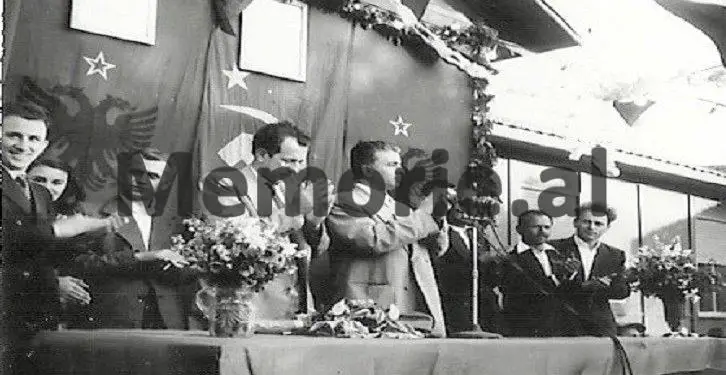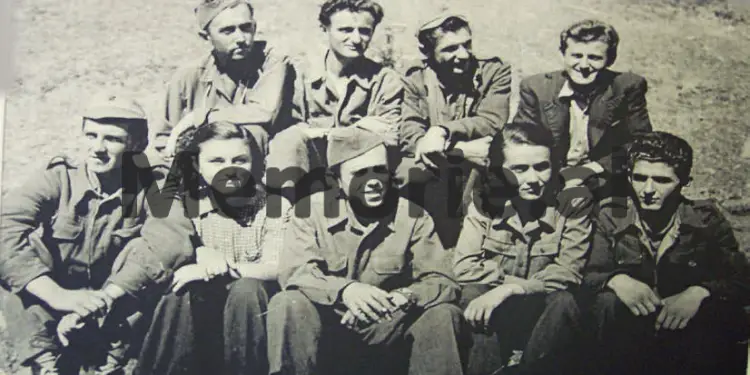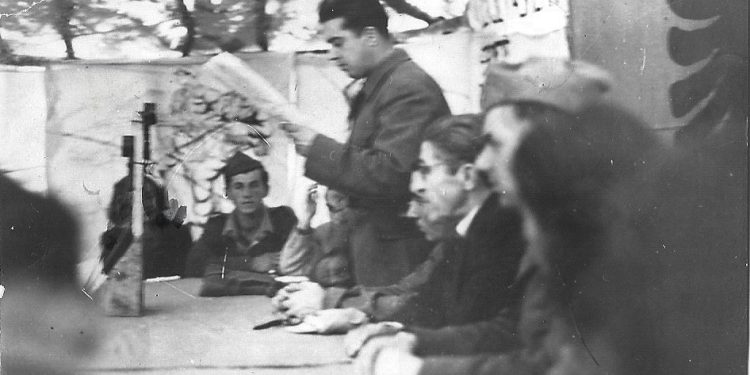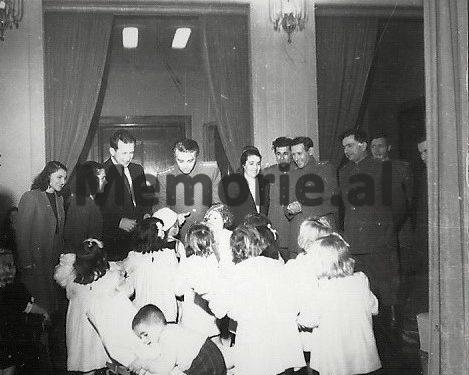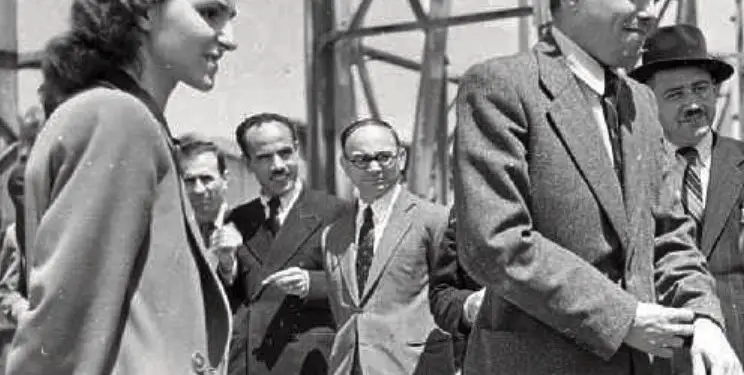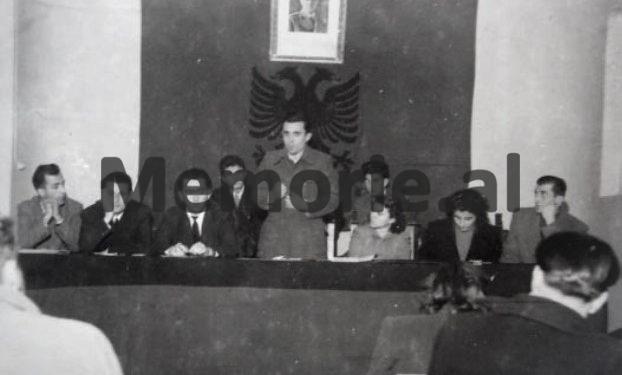Memorie.al / Liri Belishova, former senior official of the Albanian Youth and Communist Party, since the end of the War, member of the Political Bureau and secretary of the Central Committee of the PPSh, until 1961, who was then beaten and sentenced by Enver Hoxha, ending up in exile as a family for three decades in a row, in one of her interviews before she passed away, she would narrate many episodes related to her life, but also all the privations that followed her family, until the collapse of the communist regime, at the end of 1990. In this long interview, she tells many other episodes related to the death of her ex-fiancé, Nako Spiru, but also many murders, imprisonments, exiles, and other persecutions that Enver Hoxha and the Albanian Communist Party undertook against their comrades and comrades-in-arms, one of the most important personalities during the War and after it.
Ms. Belishova, you personally, when and how did you enter the communist movement for the first time?
I was very little associated with communist ideas. Perhaps, it will seem a bit strange, since I was 11 years old, I had just finished primary school, since then it was 5 years and I had gone on vacation to my father’s village, in Belishovo. There, a second cousin of mine gave me the book “Mother” to read.
Reading this book, I was very shocked, because the then reality of the area where I lived, especially, was not very beautiful. On the contrary, there were many difficulties in peasant life and I thought that this world dreamed of by the heroes of that book, by Pavli, Natasha, Sashenka, etc. it would be a very good world, a world of justice.
Independent judgment and so profound, an 11 year old?
I say that too, which is strange, but maybe my generation, which lived in some special conditions, died before its time. And, I don’t say that these were consolidated thoughts, but nevertheless it was a dream that I embraced.
A large part of your generation, at that time, was associated with communism. Why?
I think that our generation got attached to communist ideas because these ideas were very tempting at that time. The reality of their implementation in life was not known, because even our information, on the life of the Soviet Union, was not real, it was, on the contrary, very embellished. However, our generation, however, from the upbringing it received in the family and at school, was patriotic.
He inherited the dream of the Renaissance for an independent, democratic Albania and for a civilized and European Albania. And we thought that this path would save Albania from poverty, backwardness, and make it truly independent and democratic.
When was the first moment that you were engaged in the consolidated structures of communist cells?
Then I was a student at the “Nana Mbretnesë” Women’s Institute, which after the Italian occupation began to be called “Nana Skënderbej” and I had a language and literature teacher, Liri Gegë, who became one of the main exponents of the Communist Party and then, was shot by Enver Hoxha.
And she was the one who introduced me to a group of sympathizers of the communist movement, where several girls were members. This must have been a few months before the founding of the Communist Party, or perhaps a year before it was founded.
Which girls was part of this group? Which ones do you remember?
One of the girls I remember was Drita Malile, Nelka Turkeshi, the sister of Professor Çabej’s wife, Sheinaze Juka. I don’t remember the others, but there were a few of us, three or four of us.
Since what date have you been a member of the Communist Party?
In the beginning, I was a young communist and member of the party, I joined in February 1943. The admission was a little irregular. I was assigned as a member of the Regional Committee of the Communist Youth for Tirana and since a member of the Regional Committee of the Communist Youth should be a member of the Party, then at the same time, I was also accepted as a member of the Party.
What were your positions during the war? What are you up to?
With the Anti-Fascist War, almost the entire Albanian youth was connected because, as I said, it was a patriotic and anti-fascist youth and since the days of April 1939, despite the fact that we, who were sympathetic to communism, were anti-Zogist, the danger of the homeland made us too We pass these and ask that Zogu be at the head of the resistance. I remember when our school was taken to the Royal Palace to celebrate the birth of the crown prince.
It was a spontaneous demonstration of the high schools of Tirana and very exciting. Not only did we shout “Long live the Zog”, “Long live the Crown Prince”, putting aside our anti-Zogist thoughts, but we demanded weapons to fight for the defense of our motherland and such demonstrations, the youth made those days again and again, in the streets of Tirana and many cities of Albania, asking for weapons to defend the homeland.
In the moments of the War, what was the commitment you had?
During the War, I was in Tirana and I left Tirana in June 1944, to go to the First Youth Congress. So, my war has been a war of anti-fascist resistance in the city.
Have you been illegal or…?!
Partly, from the bottom. I had the opportunity not to stand out because of my age and my family. As for how my activity has been appreciated, I can say this: that being very young, I had great responsibilities. As I said, since February 1994, a member of the District Youth Committee for Tirana and at the same time one of the leaders of the Anti-Fascist Youth, for the District of Tirana. Before that, I was in the commission of the Central Committee of the Communist Youth, which also took care of the magazine “Kushtrim i Lirisa”.
Then I became the political secretary of the Regional Committee of the Communist Youth and a member of the Regional Committee of the Party, a member of the Anti-Fascist Council of the District of Tirana. At the time of the greatest reaction, a provisional committee was created to lead all the organizations of the Party and the Anti-Fascist Youth of Tirana, and I was one of these members.
In August 1944 in Helmas, I was elected a member of the Anti-Fascist Youth Secretariat and a member of the Communist Youth Central Committee. Except that all these responsibilities indicated a considerable activity that was taken into account.
You were in the partisan formations in 1944?
“I was not in the partisan formations. I was only in the leadership of the Anti-Fascist Youth and after I left Tirana.
Since you were in Tirana in those years, what were the relations between the communists and other nationalist forces, during the War, or in the years 1943-44?
I want to say this thing that there were efforts from both sides and I remember the talks of Nako Spiro, as he told me later, and Dr. Ymer Dêshnica, with some exponents of Albanian nationalism. Even with exponents who agreed, in my opinion wrongly, to cooperate with the Nazi occupiers, such as, for example, Mehdi Frashëri, who agreed to be a member of the regency.
He was a well-known man with a lot of authority, but also an outstanding and anti-fascist personality, whom the Italians kept in exile in Italy. The Germans called him and ran him, and even used him. I remember that speaking to Nako Spiru, about the struggle that the youth was waging and criticizing the position of a part of the nationalists, he became sad and cried. He talked with Nako Spiru, even with Ymer Dishnica and with Ibrahim Biçak, then with other nationalists.
And, by the way, Ymer Dishnica and Nako Spiru have proposed to Enver Hoxha to create a party called “Republikani” and be connected to the Front or take part in the Front, which would gather patriotic, nationalist elements, who were in the National Liberation Front, but also patriotic elements who were members of the National Front, but who were for war. But also other elements, who were uncommitted and who, in this case, could be committed, which, even today, I consider a very fair proposal.
How did Enver Hoxha react?
Enver Hoxha’s attitude was very strict because, in Enver Hoxha, reflecting over these years, I think that it has dominated more than the efforts for the unification of the entire Albanian people and in the first place, prominent patriots, distinguished figures , of intellectuals, the thought, how to make it easier for all power to stay in the hands of the Communist Party, that is, in his hands.
And, therefore, he did not want these elements to participate in the National Liberation Front. But, on the contrary, he wanted to fight them, and in this letter that he sends to Nako Spiru and Ymer Dishnica, he tells them that they should strengthen the fight for the unmasking of these elements.
What about the Mukje Agreement, why was it requested and why was it broken later?
I consider the breaking of the ‘Agreement’ as a very wrong thing. A serious and serious fault of Enver Hoxha, who decided to break it, not completely of his own volition, but imposed by Miladin Popovici. I call it a very, very serious fault, which had tragic consequences both during the War and during the post-war period. At the Mukje Conference, it was agreed that the ‘National Front’ and the National Liberation Front should have an agreement to fight the occupiers.
Mussolini had fallen, he was replaced by General Badolio, but the Allies were in Italy and their landing in the Balkans was expected, which would be a great blessing for the War because the Anti-Fascist Movement was very developed in the Balkans and there were many troops in the Balkans Italians who, in turn, would pass to the Anti-Fascist Front, there were many military materials, clothing, food, all of which were then passed on to the Germans.
The breakdown of the “Mukje Agreement” caused a lot of damage to people, burning, and destruction in Albania. They could have been avoided or minimized if it had not been broken because, with the breaking of the ‘Mukje Agreement’, conditions were created for the part of the compromisers to triumph in the ‘National Front’ and then the fight for life and death with the communists pushed them to be in alliance with the Germans.
There are comments that the crimes of communism started during the war…?!
It is not even discussed. In their own ranks once, that is, those who were the leaders of the Communist Groups and who had a lot of merit for this Communist Movement were annihilated. One of these was Anastas Lulo, who, by order of Miladin and Enver Hoxha, was killed in Skrapar, where he was sent as a simple partisan. Xhepi (Sadik Premtja), his friend, was able to escape, but he was also ordered to be killed.
This other one, who was the Chairman of the Shkodra group and who was a highly developed intellectual, even for that Enver Hoxha, wrote many times in the letters he sent to Gogo Nushi, that Zef Mala should be killed. And, the life of Zef Mala…, although it was accidentally saved. After his release, he lived a life in prison until he died. Then, those who were called the Vlora faction were killed. Mustafa Gjinishi was also killed.
Who killed Mustafa Gjinishi?
I don’t know exactly who killed him. Then the plenipotentiary of the Central Committee in the North was Liri Gega, and it was up to her that she was the organizer of the murder. Even more so, that the radiogram, according to the testimony of Flora Dishnica, for the execution of Mustafa Gjinishi, was made by Liri Gega. But I say that it was other people who executed him, while the order was given by Enver Hoxha for the murder of Mustafa Gjinishi”.
Why are you so sure about that?
Yes, because this thing was discussed in the second plenum of Berat and because Enver Hoxha told me with his mouth, many years later, there from 1957, in his house. That the Party ordered, that is, he was the Party, to be killed because Mustafa Gjinishi was the agent of the English.
What was the real reason for Mustafa Gjinishi’s murder?
According to what I have heard from Nako Spiru, or from others, Mustafa Gjinishi was a man from a patriotic family very well known in Central Albania. In addition, Mustafa Gjinishi was a very capable man and a very charismatic man, and being such, he could not be an obedient grandfather of Enver Hoxha. He had his personality and I believe this was what led to the murder of Mustafa Gjinishi.
But, I wanted to state here that, as was analyzed in the second Plenum of Berat, the murder of Mustafa Gjinishi sheds light on some aspects of the personality of Enver Hoxha and his teacher, Miladin Popovic. The first of the work, that this was done by their personal decision, but did not extend to the basic Party Organization, or to a Headquarters, or to a trial, where they were analyzed; where his defense was also heard, than what Enver Hoxha claimed were true.
And they did this, I think, because there were no facts, Enver Hoxha for what he said, they were just camouflage. The second was hypocrisy, that is, here the Party killed him by order of Enver Hoxha and three days of mourning were declared here. The order, signed by Enver Hoxha, lifts Mustafa Gjinish into the sky, and until recently, very late, at least until I was around until 1960, it was not said that Mustafa Gjinish was killed by the Communist Party. This is said later.
How did you know him, Nako Spiron?
“I met Nako Spiro at the beginning of 1942, immediately after the formation of the Communist Youth, at a meeting attended by activists of the Communist Youth, and he made an extraordinary impression on me because he was truly a personality with extraordinary abilities. He stood much higher than all those I had been able to meet until then. That was my first impression, which was enriched by getting to know him later.
When did you bond with him the most, that is, when did you become closer?
From the war in Tirana because even Nako Spiro developed a significant part of his war in Tirana, especially during the very difficult time of the reaction in 1943-’44. Then I really saw his abilities.
I can say that, at that time of the general teaching in the cities, mountains of the united German forces, of that part of the ‘National Front’ that cooperated with the Germans, of those who were directly connected with the Germans, of the forces of the patriots of north, who were also connected with Germans and a very serious situation was created in all the cities of Albania.
Murders, raids, imprisonment, indescribable torture and in all the cities of Albania, the anti-fascist organizations in the cities were either dispersed or paralyzed and the only organizations that stood manfully were the organizations of Tirana. And here, not only the determination and organizational strength of Nako Spiros, but also his talent as a publicist, shined.
Those articles that he wrote then, especially articles with the general title “Issues of the Day”, gave answers to all the slogans that were thrown, were eagerly awaited by all the people of Tirana./Memorie.al
The next issue follows




